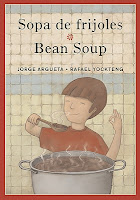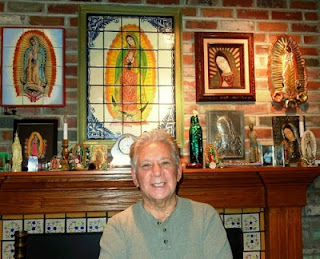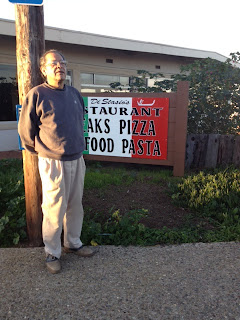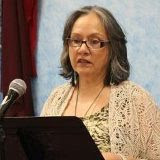Reading Classics of Chicana Chicano LiteratureReview: Alma Luz Villanueva.
Naked Ladies. Tempe AZ: Bilingual Press / Editorial Bilingue, 1994.
ISBN 0927534304
Michael Sedano
Back when I was a single man, finding a companionable woman led me seek to learn what women expect from men. I adopted a strategy of closely reading literature by women, thinking therein to identify the standards I should aspire to achieve. It’s a good thing I married in 1968. I would have given up in favor of a hermit’s cave like Rustico in the
Decameron, after reading Alma Luz Villanueva's 1994 novel,
Naked Ladies, about one woman's liberation, intimidated by the standard set by Villanueva’s character, Alma.
Twenty years after publication,
Naked Ladies stands as a Chicana Classic every man should read, simply to be grateful for the lower standard his mate, or prospective mate, tolerates.
Naked Ladies presents an intensely personal story of a single woman's change from dominated to fully in control. There is sex, violence, love, motherhood, danger. Gender issues and a woman's critical stance highlight the book's Chicana feminism. A high school teacher couldn't get away with the book's hot sex scenes nor its homosexuality, but independent young readers will find
Naked Ladies worthwhile reading because it features a strong Chicana lead, a multicultural cast, and stresses the urgency for women of being decisive, acting sooner rather than later, and mistrusting men. Most of all, though, Villanueva proves that there's always an alternative way, options, from one's most profound crises.
The complete work is itself a model of alternatives -- Part One traces Alta's liberation. We watch as Alta sheds one burden after another. Whether by choice or by circumstance a series of crises lead inevitably to that day in her life that she's the remaining survivor of her past self, and she has to begin again.
Part Two takes us to 1999, a critical year in Alta's new life. Alta is rich enough to live in rustic surroundings and employ an apprentice. Since we last saw her, Alta's completed her degree, begun a successful counseling practice, and settled into a deeply satisfying heterosexual relationship with her apprentice.
Part One is Hell, Part Two Paradise. Part Two is fairy tale where they slay the dragon and everyone lives happily ever after. Readers won't sit still for this simplistic take on a woman's life. Villanueva tosses back a structural challenge, "If Life isn't like Alta's, shouldn't it be? What do you think Alta's going to do that would prevent herself from living in the world of Part Two?"
I'm uncertain that Villanueva believes most men capable of answering that. I feel defensive for men when almost every man you meet turns out to have been sexually abused as a child or is himself a child abuser, rapist, wife abuser, adulterer. Villanueva's pretty relentless in this so the pattern is inescapable.
Alta's love with Jade mirrors Alta's nascent experiment with woman lovers in the first half, when Villanueva delivers an erotic scene whose intensity consumes the two women. In the morning though, Jackie pulls away:
Alta turned from the stove, ready to smile. Jackie s face stopped her. It was cold, distant. Angry and embarrassed. I should be going. I’ve got a million things to do today, and Jose has to be at his father’s at ten. Jackie placed an unusual emphasis on the masculine as though to set things straight. She was a normal woman, after all, her tone conveyed.It felt like a direct blow to Alta’s abdomen. She fastened her gaze on Jackie’s eyes. Are you sorry about last night? 158
People should meet Alta. Villanueva’s introduced a Chicana who defines her life for herself. Chicanisma isn’t nearly as great a concern in Alta’s life as being a woman and mother. The great tragedies in Alta’s life grow from being woman not Chicana. The writer adopts a completely personal stance in setting out to encompass important events in lives of the writer’s women: April’s first period, breast cancer, love, raising our children, other people’s children, men, rape, abortion, sexual abuse, adultery, violence against women.
Villanueva gives all her characters an ethnic identity. Alta and April, the lead women characters, along with Jackie and Rita, are Latina, Jade is Asian and Navajo, April is dark like her mother, but her father, Hugh, along with Katie, Doug, Cheryl, and Bill are Anglo. Michael and Steve, Alta’s best male friends, are black. Yet ethnicity itself keeps its place in the background of the relationships, so the absence of Chicano or Latino men in Alta’s life is unremarkable. Further, Alta expresses her ethnic identity in several ways, the allusion to grandmother s wisdom, a casual remark like,
Do you want some more coffee, loca? But while Alta hears familiar Chicano voices of protest, she feels more vitally moved by her awareness of womanhood:
An intense sorrow and longing filled Alta; so intense she almost lost consciousness for a moment. It was the child’s pain. "Yes." She saw her hunger, the shame of her poverty, the color of her skin, the sound of her Spanish being ridiculed publicly in a five-year-old’s memory, and an Indian language her grandmother spoke sometimes flickered like a vague, comforting dream that left her desolate because she could never remember, never remember, never remember.Then Alta remembered the cries of her mother, the defense of her mother, the betrayal of her mother, the longing for her mother. Her mother. Her longing for a father had stopped at eight, and now she craved only a mother. 146 - 7 Personal satisfaction and sexual identity define Alta’s values, not the cultural nor an ethnic focus on Chicanismo. One might even argue the work is not a work of Chicana Chicano Literature at all, but of some different genre, whose author simply happens to be Chicana.
Interesting woman, Alta. But the Alta you know from part two is only a possibility--she hasn't done any of this yet, or if. At Part Two the time jumps forward to 1999. This hasn’t happened yet, the seeming perfect ending: Alta finds two true Loves. A good man in Michael, a wounded Jade. Michael deals with Alta’s love for a woman with a strenuous seduction of his own. Jade, on the rebound from a failed relationship, is gang raped and accepts Alta’s and Michael s counsel. Michael is Alta’s student-become-companion. Part Two offers to resolve every unhappy ending left hanging, as Katie dies to end Part One.
The younger Alta experiences power over a man in the book’s opening pages when Alta runs down the elegant purse snatcher:
And the woman, Alta could hear as she quickly rolled down her window, was saying, Let go of me, you fucker, in a steady, angry voice.Within that silent universe there was only one choice: run him over: now. Right now.The wheel turned without effort, and Alta’s aim was perfect. The beautiful panther-man wasn’t expecting this, and his face registered shock and pain as the front bumper caught his strong, lovely legs. He’d dragged the woman halfway down the street. Now he let her go and his eyes connected to Alta’s. The reader imagines himself standing and cheering this woman, looking forward to the next few pages to see how Alta’s career unfolds from so eventful an introduction.
What follows is a series of tragedies mixed with moments of pure joy; small incremental victories that culminate in Alta’s conquest of the oppressive Hugh. Thus ends the first half of the book. Alta and Hugh have fallen into each other’s embrace a final time. Alta and inertia have their sway and Hugh dances himself into a frenzy.
I’ve been seeing someone since I was seventeen. I'm a homosexual. That’s what I am, a homosexual. And the man I've been seeing has AIDS. He's going to die. 140Jade’s view of being woman has become twisted by a vicious gang rape:
Twice, during the night, she’d sat bolt upright at a harmless sound, but nothing was harmless anymore. Nothing had ever been harmless, she realized. Being a woman is being raped as a child and being raped as a woman, and then killed if it suited them. 202Michael and Alta believe their ad hoc outdoor summer solstice ritual might provide a therapy Jade desperately requires. Alta may entertain her own motives because she loves both Michael and Jade. Alta’s keenly aware of Michael’s own enhanced sexuality in competition with Jade and Alta’s. Psychedelic mushrooms, wine, and group sex helps them perform a satisfying ritual and all seems well with mutual love and respect glowing among the three. As Jade and Alta couple, Michael watches from across the campfire, pleased at the women's satisfaction, not jealous of their physicality. There’s a standard for male behavior that readers will find incredibly tough to manage.
Villanueva doesn’t want a happily-ever-after ending, so she brings back Ray and Jim--Jade’s pair of cracker rapists--seeking revenge and blood.
Jim chuckled at the Sunday school brag. In fact, they both went to church nearly every Sunday, and if they didn’t their wives and kids did. The people in the church blamed “those feminist bitches” for causing trouble. They said those words inwardly; outwardly they said, “some folks just like to cause trouble, women like that” 263Ray feels a strong gang rape-based camaraderie with Jim:
Yes, that first time. Sloppy seconds, then sloppy eights. Makes a guy feel closer ta his buddies. Like me an’ Jim’s tight now. Jim, however, draws the line at one's own children, unlike Ray:
You ain’t messin’ with your own kids, are you?Ray laughed loudly. Ya takes stuff way too serious, Jim boy. Ya jus’ be breakin ‘em in for mankind, the way I see it.Does your old lady know?She knows an’ she knows what’s good fer ‘er. Put the fear a God in ‘er right away. Ahm the man, ain’t I? 265-6Alta hears this from cover but must watch helplessly as Jade and Michael get taken hostage. Just as Ray is about to rape Jade while Jim can t keep his hands off Michael’s genitals, Alta re-enacts the Will and power observed in the first pages of
Naked Ladies. Alta shoots and kills Jim, saving Michael, then kills the fleeing Ray.
In a culminating irony, having just killed two men--one of whom, we learn, was raped by his father from age two to five—we learn Alta is pregnant, and her child has a barely distinguishable penis. It’s a boy.
They live happily ever after, a perplexing ending. Men who think with their dicks--and most do--are the enemy. But men are sons of mothers like Alta, so why do some men turn out like Ray and Jim or Hugh and Doug? Why aren’t more men like Alta’s son, or Michael?
Villanueva puts this responsibility squarely in the woman s hands, as if to say Alta’s way is the only road to any type of idyllic future: be decisive; take action; it’s a woman s world if she wants it.
But what about Chicanos like me, not up to my tocayo’s standards, nor Alta’s?
The Gluten-free ChicanoThe Gluten-free Chicano Finds the Best Restaurant in the WorldDiStasio's On the Bay781 Market Street
Morro Bay CA 93442
805-771-8760
Wheat is poison, to the
gluten intolerant. The most recent time the Gluten-free Chicano made a mistake and ate a sugar cooky he believed was GF, he passed out and was out of commission the next day. Finding restaurants,
especially when traveling, is a game of lethal roulette.
Dining at Italian restaurants poses challenges to the Gluten-free Chicano that usually resolve themselves into a green salad with lemon juice and an expensive steak with steamed vegetables. No bread and butter appetizer, no spaghetti, no lasagne, no minestrone soup, no baked anything with bread crumb garnishes, no flour-thickened sauces, no this and no that, especially that entire left and right side of the menu.
Then a miracle.
![]() |
| The Gluten-free Chicano lined up a 8 a.m. to be first in line for that night's 4 p.m. opening. |
On his annual birding photography vacation to Morro Bay, fatigued of putting
Dorn's Restaurant servers through his standard close examination--is it thickened with flour? is there bread in it? is there wheat, barley, rye in it? would you please ask the cook and be sure? can I see the label?--he girded his loins for the ordeal and walked into an Italian place that for the past couple years had been an empty space next door to Dorn's.
The menu featured a few gluten-free dishes. When the GF Chicas Patas complimented the order taker on the restaurant's kindness, the vato offered a two-page gluten-free menu. Pasta, pasta, pasta, on the left hand side; pasta, pasta, pasta on the right hand side. Carbonara. Ravioli. Lasagne. Primavera.
Hosanna and I'll have one of everything! The delicious fresh-tasting marinara sauce was heavenly, ambrosial, on pasta. Pasta cooked perfectly and so good the GF Chicano trembled with fear that the kitchen had made an error and he'd be dead in 59 minutes.
Not only did the Gluten-free Chicano survive, he returned the next night for an expensive steak with spaghetti on the side--that wasn't on the menu and the kitchen prepared it just for the Gluten-free Chicano.
So the GF Chicano learned an important lesson. Don't make assumptions about Italian places. The best restaurant in the world is Italian. It's called
DiStasio's On the Bay in Morro Bay. ¡Ajua!
A soupçon of bad news: DiStasio's uses
Ancient Harvest quinoa pasta. As the NY Times
reports--this indeed constitutes heart-breaking news, like the "fascist" comment Whole Foods' CEO spewed leading the Gluten-free Chicano to boycott the grocery store selling the
best gf beer selection in town--there's a serious problem with quinoa:
Now demand for quinoa (pronounced KEE-no-ah) is soaring in rich countries, as American and European consumers discover the “lost crop” of the Incas. The surge has helped raise farmers’ incomes here in one of the hemisphere’s poorest countries. But there has been a notable trade-off: Fewer Bolivians can now afford it, hastening their embrace of cheaper, processed foods and raising fears of malnutrition in a country that has long struggled with it.Good-bye perfection.
The Gluten-free Chicano Makes Menudo - A Naturally GF FoodI had been collecting güiros in the remote barranca near my grandfather’s birthplace. The old indio who makes my güiros was showing me new designs and I lost track of time. I would not reach the highway before darkness so I faced being trapped along the trail and at the mercy of wild peccaries, random cucuy, and the critters of remote darkness.
I knew better than to stay with the old curandero güiro artisan, whose conecta to cucuy had given me night sweats for a month the previous visita, so I made for a settlement deeper into the barranca, the güiro maker shaking his canas telling me I'd be better off spending a sleepless night halfway up the cañon than risk what awaited me further down the barranca. I reached the small village just after sundown.
Already gente were streaming to the tiny zocalo. Señoritas done up in their finest hand-embroidered blusas, the whirling colors of their full loose skirts and faldas mixed with their bright excited laughter. Their mothers gave me el malojo but I had a talisman from el viejo.
Small clusters of men laughed in the shadows, as men will, at some off-color remark or a prediction about the night's prospects. I kept a wary eye on one vato who had taken a dislike to me on an earlier visit.
A trio of musicos, a violin, a guitar, and a güiro, on the kiosko segued from a warming up cacophony to a sweet rhythmic version of Agustin Lara's
Solamente Una Vez. There was a magic to the song I'd never sensed before, especially the long sweeping raspas of the güiro. Romance swept the plaza until everything became a blur of passion. De repente, I was whirled into the light to find myself waltzing with the most beautiful woman I had ever seen.
Candlelight caught her pupils and shone through her lustrous reddish black hair. The music drowned out everything but her eyes. The softness of her ample waist and soft sheen of sweat on her lightly pimpled brown forehead took my breath, and I whirled her across the dirt faster and faster as the güiro roared above the evening's magic. I was so intoxicated by her allure I thought I'd been enchanted and I was in a ghost story when someone pushed me into my partner and the music abruptly stopped.
"Hijo de la chingada madre, suelta a mi hermana, cabron pinche gringo." A glint caught the edge of the machete the vato brandished at his chest, pointed at mine. The shadows stirred, the dance floor rapidly emptied. I stared into the vato's eyes without blinking. Then I smiled. "¿Y tu, que vas hacer con esa navajita, mi'jo, rasparte las uñas?" I still have not decided what surprised the vato more, the
reductio ad absurdum, my diction, or the fearless glint of my ojos hinchados and ruthless half-smile.
Outrage surrounded me. Vatos had bunched up around us thinking to see blood shed--mine. But in a flash of an eye I had disarmed their local champion and twirled his machete like a juggler with a chain saw. Much as the crowd wanted blood, they wanted it to be my blood, not his. As I gently pushed my dance partner out of harm's way, she reached her lips to brush her hot breath across my cheek. I turned to quiet the murmuring crowd...
To make a long, long story short, I convinced the mob to let me treat them to a bowl of homemade menudo. I was pleased that, so far from anywhere, the village had a Wolfe stove.
Here is the recipe that earned me a dance with every woman in the ville, and the hearts of all the mothers. Flirting Abuelitas hinted I should come calling on their nietas, pressing me with photographs whose subjects were avatars for every panaderia calendar I'd ever seen except without the arrow in a breast.
The admiration of all the caballeros reflected in the abrazos I got and all the tequilazos I downed. At dawn, after they'd tasted my menudo, the cheering crowd carried me and the musicos around the plaza on their shoulders.
Ingredients5 lbs honeycomb tripe. (The fuzzy tripe is OK, too.) Put in freezer until half frozen.
1 head garlic.
1 large onion.
2 cans hominy.
Optional: 2 6" lengths of beef leg bone or 2 pig knuckles.
Red chile sauce (boil dried Anaheim, Negro, New Mexico, Guajillo, and Arbol chile pods with an onion and a head of garlic, purée, strain) or, 1 jar Gebhardt's chile powder, or 2 cans la palma chile sauce (puro chile, no tomato)
Six or more sprigs dried oregano (a Tbs or so crushed leaves)
Preparation1/2 fill large pot with cold water.
Strip fat from underside of tripe, get it all!
Cut half-frozen tripe into 2" x 2" pieces (it cuts really easily when half-frozen).
Put the panza into the pan and add the chile, unpeeled head of garlic ditto the onion, (you'll remove these later), oregano, tbs salt.
optional a bay leaf.
You can make a chicano bouquet garni by wrapping the ajo, cebolla, sprigs of oregano, in cheesecloth and tying into a bag. Dip the bay leaf into the boiling broth then take it out in 5 minutes.
Turn up the heat. When the pot begins boiling, lower the flame to a medium simmer, cover, 3-4 hours. If you are in a hurry, boil the hell out of it for an hour and a half, (or pressure cook it for 1 minute after the vapor cap starts rocking).
Monitor to ensure you don't reduce the tripe to soft squishy unpalatable gunk. The meat is done when, with a bit of effort, you can cut it with the edge of a fork.
I add the hominy when the tripe is nearly done. Dump the cans of hominy, water and all, into the menudo and add more water if you need more soup. Adjust the flavor: more salt, more chile for flavor or for picoso.
Garnishes are important. Diced onion, cilantro leaves, crushed chile de arbol or chile piquin, oregano leaves. Lemon or lime halves--do not use this recipe and serve quartered limón, or a cucuy will haunt you.
For an authentic touch, put a peeled onion cut in half and a knife on the table so diners can score the onion then slice the diced cebolla directly into the bowl.
Serve with hot tortilla de maíz. Wheat-eaters sharing your table will enjoy bolillos or tortilla de harina.
La Bloga On-Line Floricanto Penultimate Tuesday in January 2013David Lester Young, Joe Navarro, Odilia Galván Rodríguez , Sonia Gutiérrez, Andrea Mauk USS Constitution by David Lester Young
I Understand Peace, Equality, Justice and Hope (Remembering Dr. King on His Birthday) by Joe Navarro
Spirit Tree of Life By Odilia Galván Rodríguez
Song for a New Civilization by Sonia Gutiérrez
Dreams Manufactured Daily (Just Follow Along) by Andrea Mauk
USS Constitution
by David Lester Young
Ironsides iron will in Star Spangled Banner fortitude,
Deed born within a birthright Bill of Rights of longitude
Sharing latitude of sea to shining sea’s sailing Constitution
“We the people” are the strength of power point composition.
A Free Press salvo must carry its Declaration of Independence
Of editorial integrity found within questing power Truth dependence
That a writer never fears the Executive Privilege wrath of domination
That Free Speech patriotism is an imperative birth-write condition.
America is this 100% civilian elected and owned - run government,
The President, Congress, officials are not incorporated governance,
Where Conglomerates buy political stables in campaign investments.
That Special Interests must never be above neighborhood vestments.
That clothing covering our elected officials shares a Pledge of Allegiance
To this nation, but never to any Demigod of Incorporation with grievances
That threatens public officials by holding them hostage in signed contracts.
That in 1776 America divorced Royal proclamations with charter subcontracts.
America’s founding father principles are in business venture stock capitalism.
That America Dream made for people to own, invest in business commercialism
That found its American inheritance in a born in America proud vested heritage
That should never outsource our America’s Blue Collar heart and soul lineage.
Yet, fiscal cliff deconstruction seeks to destroy America from within this loyalty
That gives out tax free entitlements in Goliath welfare that shares corporate royalty.
Then this economic boa constrictor says we cannot afford civilian Social Security,
After they raped and pillaged America’s business pension plans for their futurity.
Robbing Hood barons, monster media moguls, bank-sters bankrupting Americans
Getting paid bonuses creating a 10% dominion of Conservative States of America,
Their wrath reaping havoc on the floundering USS Constitution in troubled waters
Forcing it onto fiscal cliffs without the rudder of Congress into economic slaughter.
But hear that murmur,
Feel that thunder,
See America’s heart beat coming alive,
Sense that spirit in “We the people” birthrights
That deed of inherited individual patriotism
In Star Spangled Banner-ed in F. Scott KEYS.
That Freedom, Democracy, Liberty in Free Speech,
Is not a obscenity, but this imperative necessity
That “We the people” must shout out aloud NUTS
N-ever U-nder T-yranny S-urrender
The USS Constitution.
By David Lester Young (Franklin Doppelganger) 01/16/13 ©
I Understand Peace, Equality, Justice and Hope (Remembering Dr. King on His Birthday) by Joe NavarroI understand peace, equality,
Justice and hope
Paz, igualidad, justicia
Y esperanza, even though
They sometimes remain
Elusive, the same as
Catching clouds and rainbows
The ideals are etched in
My vocabulario, en dos idiomas
I think of them in English
And español in hopes that
Two languages can cross
The threshold of oppression
I stopped dreaming in
Abstract lofty ideals that
No one can achieve without
Struggle, without un movimiento
This is what I learned that from an
Inspiration that roared from
The mind and lips of
A gentle man who stood
Unwaiveringly, face to face
With with the anti-human
Racial construct that declared
Itself superior to all on la Tierra
I was one of those chavelitos
Who listened to the spiritual discourse
For humanity against the dangers
Of racial, ethnic and international
Domination through violence,
Brutality and subjugation
I listen to the revolutionary cry to
Value la gente, human beings
Over commodities and a denunciation
Of crass materialism and racism
I listened to a giant, rich of corazón
A humble man who loved toda la gente
But despised the haters and dominators
A man who was a powerful orator
Who spoke out, even against
The threats of the most powerful
Nation on Earth, I learned from
The wise man, The Reverend Dr.
Martin Luther King, Jr who lived and died
Awakening the humanity of
People who were tired of living
Under the heels of others
Then fear and loathing traveled
From the barrel of a gun into
His physical existence on la Tierra
Yet he arose again as winged
Consciousness, a free spirit that
Traveled far and wide into the
Hearts and minds of those
Who would listen and learn
Someone, like me
~Joe Navarro © Copyright 2013
Spirit Tree of Life by Odilia Galván Rodríguez Dedicated to Chief Theresa Spence and the Idle No More Movementspirit tree tied with sacred direction colors
prayer offerings full of hopes and dreams
fears are kept at bay by sacrificing
and opening to the possibilities of prophecy
fulfilled wishes for better days of promise
a cleansing snow covers the sleeping ground
waiting for the first awakening of green
Copyright © 2013. All Rights Reserved.
Song for a New Civilizationby Sonia GutiérrezYou take the only thing
you have left to record
a people’s history—
a shard of glass and a mirror.
You write about the courage
of canons and muskets.
You include the tapered sound
of fleeting ducks fleeing
from the squeeze of an AR-15.
You press heavily on the shard
and see bodies lined up—
covered in plastic and crimson stars.
One round after another
and another, bullets from boys and men
they called strange birds. Birds
who in their silence inherited
centuries of indifference.
Every time the mirror speaks,
you gasp, pledging to innocence
that these deaths were not in vain.
You take a torn shirt and wipe
the shard of glass and mirror,
and hand wash the stars with tears
as soap suds turn a brick red.
You take the clean mirror and hold it
up high, sharing its vision
for a new civilization.
The mirror takes the boy’s toy grenade
and arms his eyes with justice.
Takes the boy’s hate
and nurtures his mind with happiness.
Takes the boy’s loneliness
and gives him a community of listeners.
Takes the boy’s silence
and arms his tongue with words.
Takes the boy’s fear
and teaches him true brotherhood.
The mirror speaks for our children
so one day these boys and men
on a whim do not wear the mask
of strange birds and in their delusion
rob us of our sisters, our grandfathers,
our teachers, our classmates,
our neighbors, our brothers,
our own children—their own future.
Dreams Manufactured Daily (Just Follow Along)by Andrea Mauk Nothing ever seems to happen
in a minute, an hour, a day,
until I look back on my life as a whole,
then I can marvel at the many things I've done
that people told me I wouldn't accomplish,
couldn't accomplish,
cuz after all, who was I?
A girl walking a tightrope
hangin' onto a balloon filled with helium dreams,
and stardust wishes.
A chubby girl with a potentially lethal
autoimmune disease.
A fool.
You'll be back, they assured me
to the beep of the scanner,
to the graveyard shift
on the West side of Phoenix
where the women sometimes
don't get into the store
without getting their purse ripped from their arms,
their faces bloodied by the butt
of a pistol
by young men who exchange their dignity
for a quick crack high.
You'll be back, they promised,
to the Valley of the Sun
and its inbred economy
where you can watch them play golf and ride horses
and swim all day long
as you make the beds
and vacuum the carpets.
You'll long for a promotion,
a job in an office where
you don't have to wear a uniform.
You'll never leave, not for long.
You can't break free of the heat that's
embedded in your pores,
the streets you can't drive down twice
because your car is too low,
your talent that's been stifled
by a wanna-be metropolis
laid out on a perfect grid
and its need to organize its people
like the rainbow of garments
in a walk-in closet,
and besides,
your music's all wrong.
Every day,
I read the sign like a mantra,
43rd Avenue next exit,
Los Angeles 356 miles
and I sang like Bootsy Collins,
'Hey, L.A. Califor- NI-AYY,
City of Angels, Hollywood.'
I counted the trips, 1, 2, 3, 57...
until the one time when I'd
pass 43rd and keep going.
I have been back
many times
to visit
and I might even consider
going back to retire
but I never went back
because I didn't succeed
or have the courage
to follow my dreams.
I left with my paintbrush,
my pencils and paper,
my sheet music, microphone
and a determination
that no matter what teachers said,
or parents predicted, or how friends laughed,
I could not be told
who I was supposed to become.
On certain days when I get to feeling
like nothing's working out as planned,
in the hardest moments when I cannot
find a way to believe in myself,
I drive past something, an image, a sign
an icon of some kind that reminds me,
Oh yeah, this is Hollywood, a place
where dreams are manufactured daily.
That's why I came here.
I have used my paintbrush,
my pencils and paper,
my microphone.
I didn't have to come here to be a dreamer,
I was born that way,
but the only dream I held tight to in Phoenix
was being able to leave it behind.
(No offense to anyone who still lives in Phoenix. I love you all very much!)
Copyright 2012 Andrea Mauk
BiosUSS Constitution by David Lester Young
I Understand Peace, Equality, Justice and Hope (Remembering Dr. King on His Birthday) by Joe Navarro
Spirit Tree of Life By Odilia Galván Rodríguez
Song for a New Civilization by Sonia Gutiérrez
Dreams Manufactured Daily (Just Follow Along) by Andrea Mauk
David Lester Young. Born Akron, Ohio. Graduated Tallmadge High School. Associate Degree University Of Southern Indiana. Creative Writer Poet Philosopher. Present location Panama City Beach, FL.
Started writing around 1970 after being honorably discharged from the Vietnam War. I started by writing poems and thoughts on napkins. Today, I start six or seven a day, some get finished, others do not.
I always have written under D. Lester Young. I also use Franklin Doppelganger, because of my resemblance to Ben Franklin, a person I greatly respect and whose ideas I find are worth using Free Speech about. I do write daily quotes like; “Free Speech is not obscenity but a necessity. Franklin Doppelganger 01/12/13
My poetry can be found by using GOOGLE and typing in David Lester Young. You can also go to the Authorsden.com site, and look up my name, David Lester Young.
Joe Navarro is a literary vato loco, teacher, poet, creative writer, husband, father and grandfather who currently lives in Hollister, CA. Joe integrates his poetic voice with life's experiences, and blends culture with politics. His poetic influences include the Beat Poets, The Last Poets, Amiri Baraka, Sonia Sanchez, Alurista, Gloria Anzaldua, Lalo Delgado and numerous others. You can read more from Joe at
www.joenavarro.weebly.com.
Odilia Galván Rodríguez, poet/activist, writer and editor, has been
involved in social justice organizing and helping people find their
creative and spiritual voice for over two decades. Her poetry has been
widely anthologized, and she is the author of three books. Her last editing
job was as the English edition editor of Tricontinental Magazine in Havana, Cuba.
Odilia is one of the founding members and a moderator of Poets
Responding to SB 1070 on Facebook. She teaches creative writing
workshops nationally, currently at Casa Latina, and also co-hosts,
"Poetry Express" a weekly open mike with featured poets, in Berkeley,
CA. For more information about workshops see her blog
http://xhiuayotl.blogspot.com/ or contact her at Red Earth Productions & Cultural Work 510-343-3693.
Sonia Gutiérrez is a poet professor, who promotes social justice and teaches English Composition and Critical Thinking and Writing at Palomar College. Her poetry, guest columns, and vignettes have been published in La Bloga’s On-line Floricanto, FRONTERA-ESQUINA, The San Diego Poetry Annual, La Jornada Semanal, AlternaCtive PublicaCtions, and contratiempo: pensamiento latinoamericano en USA. Her bilingual poetry collection, Spider Woman/La Mujer Araña (Olmeca Press), is forthcoming in 2013. She is at work on her novel, Kissing Dreams from a Distance, among other projects. To learn more about Sonia, visit her blog, Chicana in the Midst, and muy pronto at www.soniagutierrez.com.
![]()
Andrea García Mauk grew up in Arizona, where both the immense beauty and harsh realities of living in the desert shaped her artistic soul. She calls Los Angeles home, but has also lived in Chicago, New York and Boston. She has worked in the music industry, and on various film and television productions. She writes short fiction, poetry, original screenplays and adaptations, and is currently finishing two novels. Her writing and artwork has been published and viewed in a variety of places such as on The Late, Late Show with Tom Snyder; The Journal of School Psychologists and Victorian Homes Magazine. Both her poetry and artwork have won awards. Several of her poems and a memoir are included in the 2011 anthology, Our Spirit, Our Reality, and her poetry is featured in the 2012 Mujeres de Maiz “‘Zine.” She is a regular contributor to Poets responding to SB 1070. Her poems have been chosen for publication on La Bloga’s Tuesday Floricanto numerous times. She is also a moderator of Diving Deeper, an online workshop for writers, and has written extensively about music, especially jazz, while working in the entertainment industry. Her production company, Dancing Horse Media Group, is currently in pre-production of her independent film, “Beautiful Dreamer,” based on her original screenplay and manuscript, and along with her partners, is producing a unique cookbook that blends healthful recipes with poetry and prose from the community.

 Sherman Alexie’s stature as a writer of stories, poetry, and novels has soared over the course of his twenty-book, twenty-year career. His wide-ranging, acclaimed fiction throughout the last two decades, from The Lone Ranger and Tonto Fistfight in Heaven to his most recent PEN/Faulkner Award–winning War Dances, have established him as a star in contemporary American literature.
Sherman Alexie’s stature as a writer of stories, poetry, and novels has soared over the course of his twenty-book, twenty-year career. His wide-ranging, acclaimed fiction throughout the last two decades, from The Lone Ranger and Tonto Fistfight in Heaven to his most recent PEN/Faulkner Award–winning War Dances, have established him as a star in contemporary American literature. 
 Mundo Cruel
Mundo Cruel














































































































